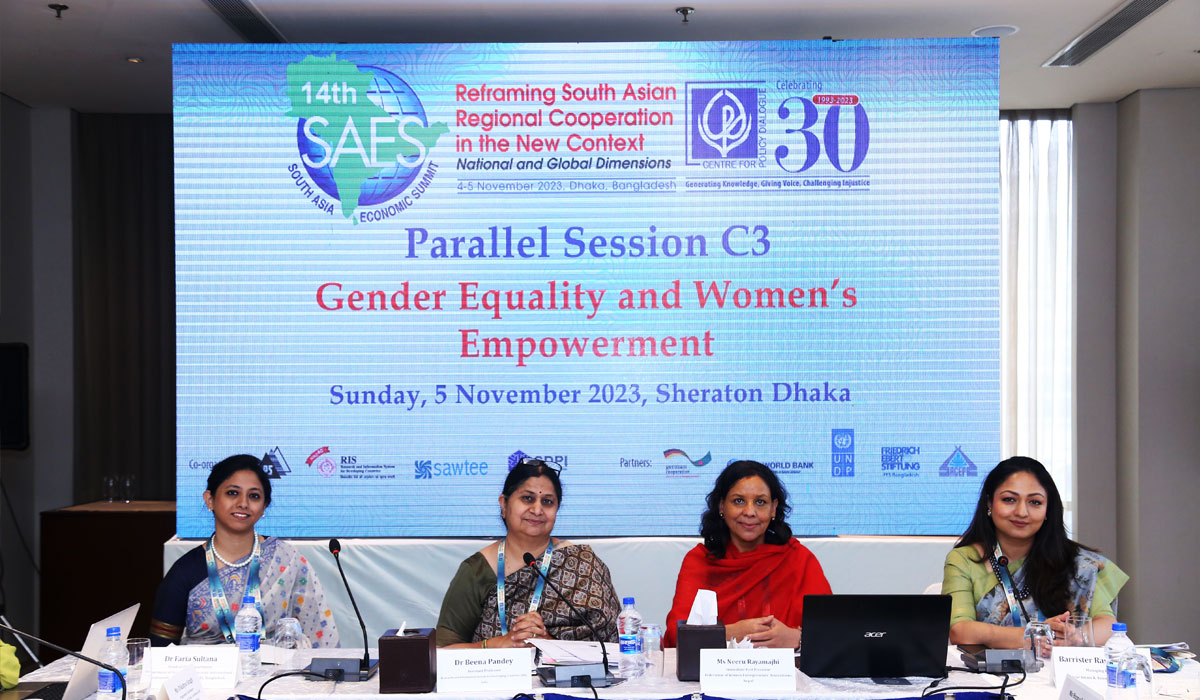
Balancing work and personal life pose a significant challenge for women, especially who often bear an unfair share of family responsibilities as sole caregivers. This imbalance underscores the need for a shift in societal mindsets to achieve gender equality. Identifying and revising discriminatory laws is also crucial for ensuring gender parity.
Women entrepreneurs in South Asia face major hurdles related to access to information and finance. The need for substantial support in terms of training and financing is evident, with a crucial role for the private sector in addressing these challenges.
The high incidence of female student dropouts in tertiary education across South Asia is primarily attributed to the lack of a safe environment. Ensuring safety in public places is essential to encourage higher female participation in education and the workforce.
To address the challenges faced by women entrepreneurs, there is a need for comprehensive support systems, including training and financial assistance. The private sector can play a pivotal role in providing the necessary resources and mentorship to empower women in business.
Ensuring the safety of women in public places is paramount for reducing female student dropouts. Implementing measures to create safe educational environments will contribute to higher retention rates and increased female participation in tertiary education.
Addressing the challenge of balancing work and personal life requires a societal shift in mindset. Encouraging equal sharing of family responsibilities and promoting policies that support work-life balance are essential. Additionally, revising discriminatory laws is crucial to creating an environment that fosters gender equality and supports women in their dual roles as caregivers and professionals.
These are some of the insights that emerged at the parallel session C3 of the Fourteenth South Asia Economic Summit (SAES XIV) titled ‘Gender equality and women’s empowerment’ held on 5 November, 2023.
The Chair of the session, Dr Beena Pandey, Assistant Professor, Research and Information System for Developing Countries (RIS), India, suggested, ‘Providing education to children in local languages may help to increase female enrollment in schools’.
‘Businesses can come forward to fill the gap in government and civil society initiatives to address gender inequality’ recommended Ms Huma Fakhar, Founder and Chairperson, MAP Capital Holdings, Pakistan.
Barrister Rashna Imam, Managing Partner, Akhtar Imam & Associates, cautioned ‘If we cannot ensure safety for women in public spaces, we will fail to increase female participation in education and the labour force’.
‘Women entrepreneurs require capacity building through training, skill development programmes, and participation in networking and outreach activities’ highlighted Ms Neeru Rayamajhi, Immediate Past President, Federation of Women Entrepreneurs’ Associations, Nepal.
Dr Faria Sultana, Head of the Department, Department of Economics, American International University-Bangladesh (AIUB), emphasised ‘Changing mindsets is crucial for achieving gender equality in society. We need to raise girls in a way that empowers them to believe in themselves’.
The Programme Coordinator of South Asia Watch on Trade, Economics, and Environment (SAWTEE), Ms Dikshya Singh, highlighted ‘Balancing work and personal life is a major challenge for women, especially as they are viewed as the sole caregivers in society.’
Dr Debapriya Bhattacharya, Distinguished Fellow, CPD, also attended the session and underscored ‘Household allocative behaviour is very gender discriminative in nature. Parents in poverty choose not to spend on the girl child if there is shortage of finances’.
High-level policymakers, political leaders, academics, development practitioners, civil society activists from Bangladesh and the South Asian region attended the session and shared their valuable insights.
- Concept Note
- Programme
- Presentations
– Cooperation in Public Health – Rudra Suwal
– Cross-Border Labour Flows in South Asia: An Overview – Raghav Chakravarthy
– Macroeconomic Policy Choices in South Asia: Ideas and Choices – Dr. Priyadarshi Dash
– Role of Knowledge Actors in Advancing a New Political Settlement in South Asia – Sanjib Baruah
– Towards an Integrated Energy Grid – Dr. Shankar Shrestha - Session Guidelines
– Plenary Session 1 | Plenary Session 2 | Plenary Session 3
– Parallel Session A1 | Parallel Session A2 | Parallel Session A3
– Parallel Session B1 | Parallel Session B2 | Parallel Session B3
– Parallel Session C1 | Parallel Session C2 | Parallel Session C3 - Speeches
– Welcome Remarks by Dr Fahmida Khatun
– Speech by Dr. Nandalal Weerasinghe
– Speech by Dr Paras Kharel
– Speech by Dr Yuba Raj Khatiwada
– Conference Summary by Dr Khondaker Golam Moazzem - Webpost
Inaugural Session | Plenary Session 1 | Parallel Session A1 | Parallel Session A2 | Parallel Session A3 | Plenary Session 2 | Plenary Session 3 | Parallel Session B1 | Parallel Session B2 | Parallel Session B3 | Parallel Session C1 |Parallel Session C2 | Parallel Session C3 | Closing Session - Photos of the Conference
Inaugural Session | Plenary Session 1 | Parallel Session A1 | Parallel Session A2 | Parallel Session A3 | Plenary Session 2 | Plenary Session 3 | Parallel Session B1 | Parallel Session B2 | Parallel Session B3 | Parallel Session C1 | Parallel Session C2 | Parallel Session C3 | Closing Session | Cultural Programme - Videos of the Conference
Inaugural Session | Plenary Session 1 | Parallel Session A1 | Parallel Session A2 | Parallel Session A3 | Plenary Session 2 | Plenary Session 3 | Parallel Session B1 | Parallel Session B2 | Parallel Session B3 | Parallel Session C1 | Parallel Session C2 | Parallel Session C3 | Closing Session | Cultural Programme


